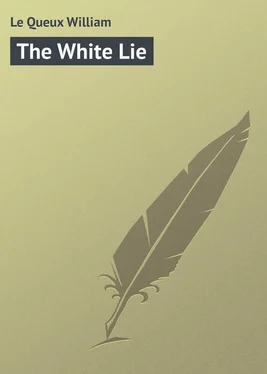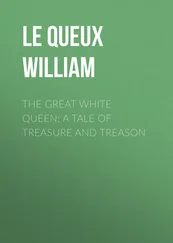William Le Queux - The White Lie
Здесь есть возможность читать онлайн «William Le Queux - The White Lie» — ознакомительный отрывок электронной книги совершенно бесплатно, а после прочтения отрывка купить полную версию. В некоторых случаях можно слушать аудио, скачать через торрент в формате fb2 и присутствует краткое содержание. Жанр: Классический детектив, foreign_detective, foreign_prose, на английском языке. Описание произведения, (предисловие) а так же отзывы посетителей доступны на портале библиотеки ЛибКат.
- Название:The White Lie
- Автор:
- Жанр:
- Год:неизвестен
- ISBN:нет данных
- Рейтинг книги:5 / 5. Голосов: 1
-
Избранное:Добавить в избранное
- Отзывы:
-
Ваша оценка:
- 100
- 1
- 2
- 3
- 4
- 5
The White Lie: краткое содержание, описание и аннотация
Предлагаем к чтению аннотацию, описание, краткое содержание или предисловие (зависит от того, что написал сам автор книги «The White Lie»). Если вы не нашли необходимую информацию о книге — напишите в комментариях, мы постараемся отыскать её.
The White Lie — читать онлайн ознакомительный отрывок
Ниже представлен текст книги, разбитый по страницам. Система сохранения места последней прочитанной страницы, позволяет с удобством читать онлайн бесплатно книгу «The White Lie», без необходимости каждый раз заново искать на чём Вы остановились. Поставьте закладку, и сможете в любой момент перейти на страницу, на которой закончили чтение.
Интервал:
Закладка:
There was but one verdict which the twelve honest men of Mundesley could return.
Expert evidence agreed that the quick-release at the end of one of the stay-wires was faulty. The steel bolt holding the main-stay cable and secured by a split-pin could not be found. It had evidently broken and fallen out, so that the left wing, being thus unsupported, had collapsed in mid-air.
And in face of these facts the jury returned a verdict of “Accidental death.”
This the public read next morning in their newspapers, together with expressions of deep sympathy and declarations that the air was, as yet, unconquered.
On the same day as the inquest was held upon the body of Lieutenant Barclay, a coroner’s inquiry was held at the little market-town of North Walsham, which, though inland, is the relay for the telegraph-cables diverging to Northern Europe, into the discovery on the highway of the body of the motor-cyclist, Mr. Richard Harborne.
Held in a schoolroom near the railway station, public and witnesses sat upon the school benches, while the coroner occupied the headmaster’s desk.
Again there was an array of witnesses, but from the first the crowd at the back of the room scented mystery.
A carter of the village of Worstead, speaking in his broad Norfolk brogue, described how he had discovered the body and had come into North Walsham and told a constable.
“I was a coomin’ into North Walsham wi’ a load o’ hay what I’d got from Mr. Summers, o’ Stalham, when just after I turned into the Norwich road I saw sawmthin’ a-lyin’ in the ditch,” he said slowly, while the grey-haired deputy-coroner carefully wrote down his words.
“Well?” asked the official, looking up at the witness.
“Well, sir, I found it was ’im,” the man replied.
“Who?”
“The gentleman what war killed.”
“The deceased, you mean,” said the coroner.
“Yes, sir. I went over and found ’im a-lyin’ face downwards,” was the reply. “I thought ’e wor drunk at first, but when I see blood on the road I knowed there’d been sawmthin’ up. So I went over to ’im.”
“In what position was the body when you discovered it?” the coroner asked.
“’E wor a-lyin’ with ’is feet in the water an’ ’is ’ead in the brambles like.”
“As if he had fallen there?”
“No, sir. As if ’e’d been thrown into the side o’ the road. There was blood – a lot of it all alon’ the road.”
“What did you do?”
“Well, I pulled ’im out, and saw a nasty cut in ’is throat. So I drove on to North Walsham and saw Mr. Bennet.”
“Anything else?”
“No, sir, nawthin’ else.”
“Any juryman wish to ask a question?” inquired the coroner, looking across at the twelve local taxpayers.
The foreman, a stout farmer, said:
“I’d like, sir, to ask the witness if the gentleman was dead when he pulled him out of the ditch.”
“Dead as mutton,” was the witness’s prompt reply.
“You think he was dead? He may not have been,” the coroner remarked.
“Well, I put my ’and on ’is ’eart an’ it didn’t beat, sir.”
“Very well,” said the official holding the inquiry, “that will do.”
Superintendent Bennet, of the Norfolk Constabulary, stationed at North Walsham, gave evidence regarding the discovery. He described how the previous witness had called at the police-station, and how they went out in a light trap on the Norwich road together.
“I found deceased lying on the grass on the left side of the road close to a telegraph post,” he said, while a tall, grey-faced, well-dressed man of forty-five, of a somewhat military appearance, who was seated at the back of the room, leaned forward attentively to catch every word. “The thorn bushes beside the ditch were broken down by the body apparently being cast there. It was getting dusk when I arrived on the spot, but I could clearly see traces of blood for about forty feet from the ditch forward in the direction of Norwich.”
“Then the body must have been carried back from the spot where the blow was struck?”
“It was dragged back. A shower had fallen in the afternoon, and there were distinct marks on the damp road where the heels of the deceased had scraped along, and also the footmarks of the murderer.”
At these words those present in court held their breath.
“Have you taken any action in regard to those footmarks?”
“I have not, sir. But the detectives from Norwich have,” answered the officer.
“Could you see the track of deceased’s motor-cycle?”
“Quite plainly. The deceased apparently dismounted close to the spot where the first trace of blood appeared, for there were marks of a struggle. The gentleman must have been struck down and promptly flung into the ditch, after which his assailant mounted the cycle and rode off.”
“Towards Norwich?”
“Yes, sir – in that direction.”
The grey-faced man at the back of the room was now all attention. Upon his countenance was a curious, intense look. The coroner noticed him, and became puzzled, even suspicious. Nobody knew the man or why he was present. Yet to him the death of Richard Harborne was, without a doubt, of the very greatest concern.
More than once the coroner looked suddenly up from writing the depositions, regarding him with covert glances. Though he had all the appearance of a gentleman, yet there was about him a strange, almost imperceptible air of the adventurer. A close observer would have noticed that his clothes bore the cut of a foreign tailor – French or Italian – and his boots were too long and pointed to be English. His well-kept, white hands were the hands of a foreigner, long and pointed, with nails trimmed to points, and upon his left wrist, concealed by his round shirt-cuff secured by solitaires in place of links, he wore a gold bangle which inside bore an inscription.
At times his grey, hard face was impassive and sphinx-like, yet to the narrative of how Richard Harborne was discovered he listened with a rapt attention it was impossible to conceal.
Yes, the coroner himself decided that there was an air of mystery surrounding the stranger, and resolved to tell the police at the conclusion of the inquiry.
Superintendent Bennet, in answer to further questions put by the coroner, said:
“At Gordon’s Farm, to which we carried the body, I searched the dead man’s pockets. From the Foreign Office passport I found, I learned the name of the gentleman, and from some letters addressed to him at the King’s Head, at Beccles, I was soon able to ascertain by telephone that he had been stopping there for some little time. Most of the letters were private ones, but two of them were enclosed in double envelopes, and written on plain paper without any address or any signature. They were written in the dots and dashes of the Morse alphabet. A post-office telegraphist has seen them, and says that the letters are a jumble and form no words, therefore they must be secret correspondence in code.”
And he handed the two letters in question to the coroner, who examined them with considerable curiosity, while the stranger at the back of the court folded his arms suddenly and looked entirely unconcerned.
“I also found this,” the superintendent went on, handing a piece of tracing linen to the coroner. “As far as I can make out, it is a tracing of some plan or other. But its actual significance I have been unable to determine.”
The coroner spread it out upon his writing-pad and looked at it with a puzzled expression.
“Anything else?” he inquired.
“Yes, sir; this,” and the officer produced the torn half of a man’s visiting-card.
“This is apparently part of one of the deceased’s own cards,” the coroner remarked, holding it before him, while the court saw that it had been torn across obliquely, leaving a jagged edge.
Читать дальшеИнтервал:
Закладка:
Похожие книги на «The White Lie»
Представляем Вашему вниманию похожие книги на «The White Lie» списком для выбора. Мы отобрали схожую по названию и смыслу литературу в надежде предоставить читателям больше вариантов отыскать новые, интересные, ещё непрочитанные произведения.
Обсуждение, отзывы о книге «The White Lie» и просто собственные мнения читателей. Оставьте ваши комментарии, напишите, что Вы думаете о произведении, его смысле или главных героях. Укажите что конкретно понравилось, а что нет, и почему Вы так считаете.












